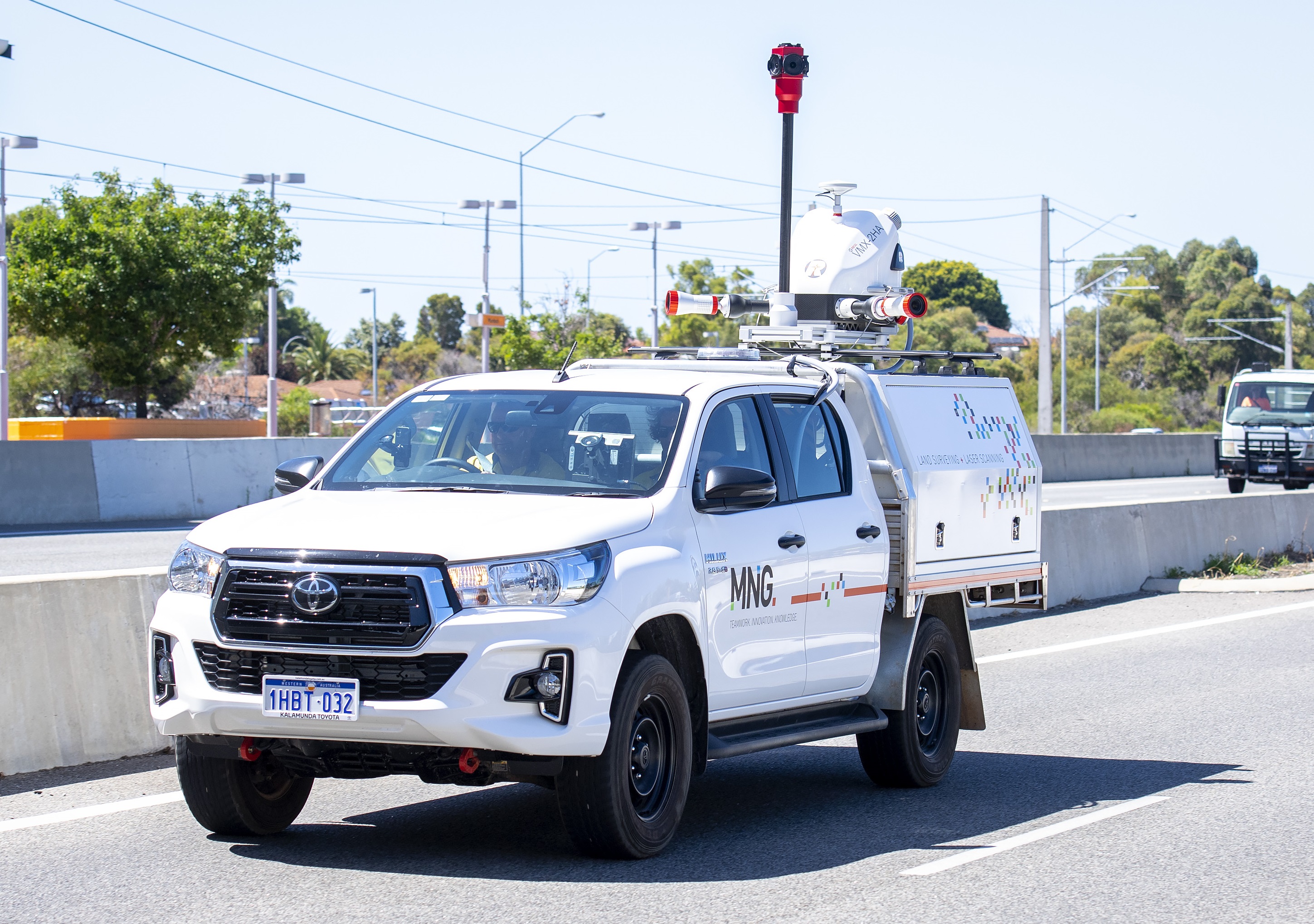MNG celebrates a decade of mobile laser scanning with a new Riegl VMX-2HA system

6th January 2021
A significant milestone in Mobile Laser Scanning (MLS) was celebrated in 2020 as MNG (MNG) achieved ten years of continual service in the MLS market. As one of Australia’s leading innovators in MLS, Perth headquartered survey and spatial information business MNG, continued their stronghold as market leader with the recent purchase of the new Riegl VMX-2HA MLS system.
The initial thrust in laser scanning began in 2001 with the acquisition of a Leica Cyrax 2500 terrestrial laser scanner, which was followed, by a series of Leica scanners including the HDS 3000, 6000, C10, 7000, P30, P40 and the RTC360 models. The range of equipment was only surpassed by the surveyors at MNG who developed and honed their skills and knowledge in laser scanning techniques and systems that put them at the forefront of 3D scanning systems in Australia.
A worldwide search in 2009 for an MLS system soon established that no turnkey solution would achieve the demanding accuracies required for a vehicle-based system. Subsequently the innovative streak with MNG saw approval from the MNG board to commence upon the development of an MLS system. Inhouse engineering skills to successfully integrate laser scanners, inertial measurement units, global navigation satellite systems, imagery sensors along with the necessary computer software were put to the test. However, within a year MNG embarked upon their first MLS survey in Australia for Main Roads Western Australia (MRWA) upon a stretch of the Indian Ocean Drive at Greenhead in Western Australia.
The MLS system was designed to be secured to the vehicle’s roof rack, and pivot from one side to the other, providing intersecting paths for the laser beam to minimise shadowing behind objects, and maximise accuracy of points within the survey point cloud. Of interest many systems with a single scanner operate with this principle today. The system proved to be hugely successful and was used on projects across Australia. The accuracies achieved with the system surpassed the original scope and the benefits of mobile laser scanning was soon to be realised. The system, internally known as, “The Rabbit” made its way across Australia, and was used on roads, railways, and boats.
Built upon the success of the portable “Rabbit” system, MNG commissioned two further MLS systems to service the growing demand across Australia in transport corridors. The purpose built “Cirrus” vehicles set another new standard in MLS systems within Australia. The MLS system was positioned on a hydraulic platform which could be raised and lowered so that mobilisation on site could be achieved safely and efficiently within a matter of minutes. Furthermore the “Cirrus” MLS could accommodate two laser scanners operating simultaneously. By enlarge the architecture of the system remained unchanged, although individual sensors had now improved across the years.
Riegl had released their VUX-1HA scanner which had could achieve one million pointers per second, along with 250 scan lines per second at a survey grade accuracy of 5mm which were incorporated into the MNG MLS systems. By 2015 MNG maintained MLS systems and operators on the east and west coasts of Australia.
In conjunction with the hardware platforms the onboard firmware, data capture software and office processing software were a necessity to operate the MLS systems. Yet again MNG’s innovative approach in the geospatial sector saw the multi-pass methodology to improve point cloud accuracy introduced and become adopted within the industry. Inhouse data processors were trained and specialised in MLS processing to further refine point clouds and have set the standard in the MLS markets.
Naturally, the plethora of data being captured had to be processed and backed up across the country which has created another set of challenges within the business. This has required significant back-office structures and processes to support ongoing field operations. Once again MNG has surpassed its own standards in supporting the development of big data sets and ongoing software development across multiple platforms and operators.
Early in 2020 MNG completed an internal audit of the MLS systems and peripheral software and processes that it had developed and acquired over the past ten years in pursuit of the next ten years. Next MNG conducted a worldwide appraisal of MLS systems to determine if the turnkey solutions met the objectives of the business and that the respective manufacturer and distributor shared similar goals. After weighing up both sides of the equation to continue development or to invest in a turnkey MLS system, MNG opted to partner with Riegl, with whom MNG had established a longstanding relationship with spanning nearly ten years.
Consequently, MNG chose the Riegl VMX-2HA as their next MLS system. The Riegl VMX-2HA is the most advanced MLS unit manufactured by Riegl, with twin scanners and high-resolution cameras. Complementing MNG’s existing fleet of scanning systems, the high speed, high performance mapping system is ideal for surveys with demanding specifications. The revolutionary technology produces dense, accurate and feature-rich data and includes multiple camera systems for precisely georeferenced images. This further enables the system to capture detailed and reliable data for pavement condition and crack indexing and analysis.
MNG has a commitment to providing a superior service to client’s specification needs, which is reinforced by the introduction of this highly transportable MLS system. MNG have been busy putting the newly acquired, highly portable system to use, working on a number of key projects around the Perth metropolitan area. The VMX-2HA system will deliver an enhanced service to the transportation and infrastructure markets throughout the nation.